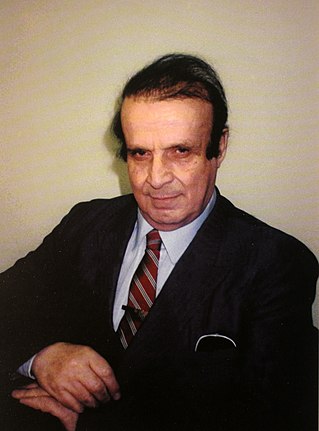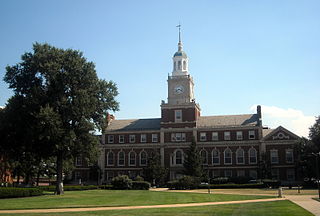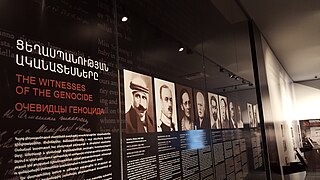Related Research Articles

Bernard Lewis, was a British American historian specialized in Oriental studies. He was also known as a public intellectual and political commentator. Lewis was the Cleveland E. Dodge Professor Emeritus of Near Eastern Studies at Princeton University. Lewis's expertise was in the history of Islam and the interaction between Islam and the West.

Vahakn Norair Dadrian was an Armenian-American sociologist and historian, born in Turkey, professor of sociology, historian, and an expert on the Armenian genocide.

Guenter Lewy is a German-born American author and political scientist who is a professor emeritus of political science at the University of Massachusetts Amherst. His works span several topics, but he is most often associated with his 1978 book on the Vietnam War, America in Vietnam, and several controversial works that deal with the applicability of the term genocide to various historical events. Lewy sees the word genocide as an inappropriate label for either Romani genocide or Armenian genocide.

The Moorland–Spingarn Research Center (MSRC) in Washington, D.C., is located on the campus of Howard University on the first and ground floors of Founders Library. The MSRC is recognized as one of the world's largest and most comprehensive repositories for the documentation of the history and culture of people of African descent in Africa, the Americas, and other parts of the world. As one of Howard University's major research facilities, the MSRC collects, preserves, organizes and makes available for research a wide range of resources chronicling the Black experience. Thus, it maintains a tradition of service which dates to the formative years of Howard University, when materials related to Africa and African Americans were first acquired.
Armenian Americans are citizens or residents of the United States who have total or partial Armenian ancestry. They form the second largest community of the Armenian diaspora after Armenians in Russia. The first major wave of Armenian immigration to the United States took place in the late 19th and early 20th centuries. Thousands of Armenians settled in the United States following the Hamidian massacres of the mid-1890s, the Adana Massacre of 1909, and the Armenian genocide of 1915–1918 in the Ottoman Empire. Since the 1950s many Armenians from the Middle East migrated to the U.S. as a result of political instability in the region. It accelerated in the late 1980s and has continued after the dissolution of the Soviet Union in 1991 due to socio-economic and political reasons. The Los Angeles area has the largest Armenian population in the United States.
Justin A. McCarthy is an American demographer, former professor of history at the University of Louisville, in Louisville, Kentucky. He holds an honorary doctorate from Boğaziçi University (Turkey), was awarded the Order of Merit of Turkey, and is a board member of the Institute of Turkish Studies and the Center for Eurasian Studies (AVIM). His area of expertise is the history of the late Ottoman Empire.

Armenian genocide denial is the claim that the Ottoman Empire and its ruling party, the Committee of Union and Progress (CUP), did not commit genocide against its Armenian citizens during World War I—a crime documented in a large body of evidence and affirmed by the vast majority of scholars. The perpetrators denied the genocide as they carried it out, claiming Armenians were resettled for military reasons, not exterminated. In the genocide's aftermath, incriminating documents were systematically destroyed, and denial has been the policy of every government of the Republic of Turkey, as of 2023.

In the psychology of human behavior, denialism is a person's choice to deny reality as a way to avoid a psychologically uncomfortable truth. Denialism is an essentially irrational action that withholds the validation of a historical experience or event when a person refuses to accept an empirically verifiable reality.

The Armenian Assembly of America is the largest Washington-based nationwide organization promoting public understanding and awareness of Armenian issues. The organization aims to "strengthen United States/Armenia relations, promote Armenia's democratic development and economic prosperity, and seeks universal affirmation of the Armenian genocide" via "research, education and advocacy."
The Assembly of Turkish American Associations (ATAA), created in 1979, is the umbrella organization whose stated purpose is to promote cooperation between the social and cultural Turkish American organizations around the United States. ATAA informs the Turkish American community on how to foster Turkish-American relations and promotes a positive view of Turkey. The organization is also known for its unsuccessful lawsuits arguing for the inclusion of Armenian genocide denial as a legitimate alternate view in the US educational curriculum.

Richard Gable Hovannisian is an Armenian American historian and professor emeritus at the University of California, Los Angeles. He is known mainly for his four-volume history of the First Republic of Armenia.
The Zoryan Institute is a non-profit organization and registered charity in the United States and Canada that promotes the study and recognition of the Armenian genocide as well as other genocides throughout history. Historian Dominik J. Schaller states that while "its scientific and pedagogic activities to be of great value", the institute also functions as "an influential actor in memory politics".

Stanford Jay Shaw was an American historian, best known for his works on the late Ottoman Empire, Turkish Jews, and the early Turkish Republic. Shaw's works have been criticized for their lack of factual accuracy as well as denial of the Armenian genocide, and other pro-Turkish bias.
The Institute of Turkish Studies (ITS) is a foundation based in the United States with the avowed objective of advancing Turkish studies at colleges and universities in the United States. Having been founded and provided a grant from the Republic of Turkey in the 1980s, the institute has issued undergraduate scholarships, language study awards, grant money to scholars, and underwritten the holding of workshops. Its work has also attracted controversy by observers who have criticized it as a body held under the sway of the political ideology of the Turkish state, active in the denial of the Armenian genocide and other topics considered taboo, such as the condition of the Kurds in the country.
Heath Ward Lowry is the Atatürk Professor of Ottoman and Modern Turkish Studies emeritus at Princeton University and Bahçeşehir University. He is an author of books about the history of the Ottoman Empire and Modern Turkey.
Jean-Claude Kebabdjian is an Armenian-French publisher, journalist and author. Since the 1970s he raised awareness of Armenian memory and Armenian culture within the French society and within Europe.
USC Shoah Foundation – The Institute for Visual History and Education, formerly Survivors of the Shoah Visual History Foundation, is a nonprofit organization dedicated to making audio-visual interviews with survivors and witnesses of the Holocaust and other genocides, a compelling voice for education and action. It was established by Steven Spielberg in 1994, one year after completing his Academy Award-winning film Schindler's List. In January 2006, the foundation partnered with and relocated to the University of Southern California (USC) and was renamed the USC Shoah Foundation – The Institute for Visual History and Education. In March 2019, the institute opened their new global headquarters on USC's campus.

Witnesses and testimony provide an important and valuable insight into the events which occurred both during and after the Armenian genocide. The Armenian genocide was prepared and carried out by the Ottoman government in 1915 as well as in the following years. As a result of the genocide, as many as 1.5 million Armenians who were living in their ancestral homeland were deported and murdered.
The Center for Contemporary Jewish Documentation is an independent French organization founded by Isaac Schneersohn in 1943 in the town of Grenoble, France during the Second World War to preserve the evidence of Nazi war crimes for future generations. After the Liberation, the center was moved to Paris in 1944 where it remains today.
The Armenian Massacres in Ottoman Turkey: A Disputed Genocide is a 2006 book by Guenter Lewy about the Armenian genocide in the Ottoman Empire. In the book, Lewy argues that the high death toll among Ottoman Armenians was a byproduct of the conditions of the marches and on sporadic attacks rather than a planned attempt to exterminate them.
References
- ↑ G. Hovannisian, Richard (2003). Looking Backward, Moving Forward: Confronting the Armenian Genocide. p. 201. ISBN 9781412827676.
- ↑ Varoujan, Karentz (2004). Mitchnapert the Citadel: A History of Armenians in Rhode Island. p. 164. ISBN 9780595306626.
- ↑ Totten, Samuel (2002). Pioneers of Genocide Studies. p. 23. ISBN 9780765801517.